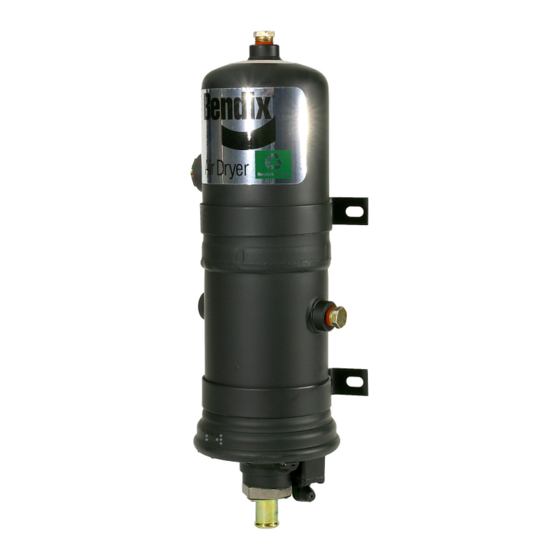BENDIX AD-2 Hizmet Verileri - Sayfa 5
Nem Alıcı BENDIX AD-2 için çevrimiçi göz atın veya pdf Hizmet Verileri indirin. BENDIX AD-2 16 sayfaları.
Ayrıca BENDIX AD-2 için: Manuel (16 sayfalar)

Purge Cycle: (See Figure 4.) When the desired system
pressure is reached, the governor cuts-out, pressurizing
the unloader cavity of the compressor which unloads the
compressor (non- compressing cycle). The line connecting
the governor unloader port to the end cover purge valve
port (bottom of the air dryer) is also pressurized, opening
the exhaust of the purge valve to atmosphere. With the
exhaust of the purge valve open, contaminants in the
discharge line and dryer sump are purged, or forced past
the open exhaust out to atmosphere.
The reverse air fl ows across the desiccant and starts the
removal process of moisture from the desiccant surface.
Dry air fl owing from the purge volume through the purge
orifi ce and across the drying bed further dries the desiccant.
The combination of these reverse fl ows strips the water
vapor from the desiccant (drying bed). This normally takes
between 15–30 seconds.
The desiccant becomes activated from this cycle and is
now ready for another charge cycle, which occurs when
the compressor returns to the compressing cycle. It is for
this reason the air dryer must be purged for 30 seconds
after receiving moisture-saturated air for a maximum of 90
seconds from a 12 CFM compressor.
This air dryer is intended to remove moisture and other
contaminants normally found in the air brake system. Do
not inject alcohol, anti-freeze, or other de-icing substances
into, or upstream of, the air dryer. Alcohol is removed by
the dryer, but reduces the effectiveness of the device to
dry air. Use of other substances can damage the air dryer
and may void the warranty.
Figure 5 – Ball Check Valve
PREVENTIVE MAINTENANCE AND CHECKING
SERVICEABILITY
IMPORTANT
Review the warranty policy before performing any intrusive
maintenance procedures. An extended warranty may be
voided if intrusive maintenance is performed during this
period.
Every 900 operating hours, or 25,000 miles, or every three
(3) months:
1. Check for moisture in the air brake system by opening
reservoirs, drain cocks, or valves, and look for the
presence of water. If moisture is present, the desiccant
may require replacement; however, the following
conditions can also cause water accumulation and
should be considered before replacing the desiccant:
A. An outside air source has been used to charge the
system. This air did not pass through the drying
bed.
B. Air usage is exceptionally high and not normal for
a highway vehicle. This may be due to accessory
air demands or some unusual air requirement that
does not allow the compressor to load and unload
(compressing and non-compressing cycle) in a
normal fashion. Check for high air system leakage.
C. The air dryer has been installed in a system that
has been previously used without an air dryer. This
type of system will be saturated with moisture and
several weeks of operation may be required to dry
it out.
D. Location of the air dryer is too close to the air
compressor. Refer to "Installation" section.
E. In areas where more than a 30° range of
temperature occurs in one day, small amounts
of water can accumulate in the air brake system
due to condensation. Under these conditions, the
presence of small amounts of moisture is normal
and should not be considered as an indication that
the dryer is not performing properly.
Note also that a small amount of oil in the system
may be normal and should not, in itself, be
considered a reason to replace the desiccant; oil
stained desiccant can often function adequately.
2. Check mounting bolts for tightness.
3. Check the operation of the integral single check valve
®
in the Bendix
AD-2
valve used with the Bendix
air system to governor cut-out and observe the test
air gauge installed in the #1 reservoir. A rapid loss of
pressure could indicate a failed check valve. This can
be confi rmed by checking at the purge valve exhaust.
®
air dryer or the "in line" check
®
™
AD-1
air dryer. Build the
5
